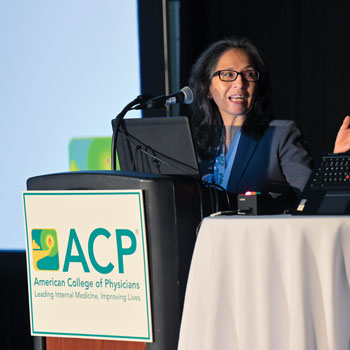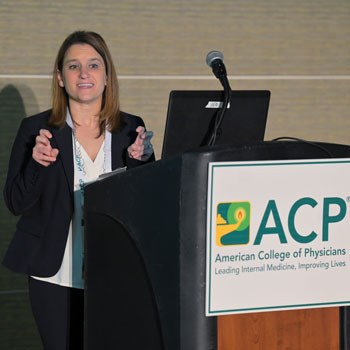Persevere along the trail of your advocacy journey
ACP members took to the Capitol for Leadership Day to address reducing administrative burden, compensating physicians for the value of care they provide, and supporting programs that strengthen the physician workforce.
Following ACP's recent successful Leadership Day in Washington, D.C., I decided to unwind by taking a walk through the woods, specifically a four-day, three-night section hike of the Appalachian Trail in southern Virginia.
This is my third section hike of the trail—I have previously hiked a large section farther north in Virginia to see the "triple crown" of sites (Tinker Cliffs, McAfee Knob, and Dragon's Tooth) and most of the trail in Connecticut, where apparently they have never heard of switchbacks. For all these hikes, I found myself thinking of Bill Bryson's "A Walk in the Woods: Rediscovering America on the Appalachian Trail" and remembering a particular quote: "This wouldn't be so bad, I told myself. But secretly, I know that I was quite wrong."
Hiking the Appalachian Trail is simply a grueling and demanding endeavor for both your body and your mind. In fact, if one were to hike the entire length of it (as many do each year), the elevation gained and lost is equivalent to hiking Mount Everest from sea level and back 16 times!
So, as I was hiking my section this year, particularly since it fell immediately after Leadership Day, I began to draw some parallels between my endeavor and that of ACP's advocacy. First, to engage in advocacy of any form, you must take the initial step. This first step and the next few that follow are full of enthusiasm and optimism about the journey ahead and the successes you expect based on your actions. My hope is that this year's Leadership Day served as that first step for many ACP members. In the end, we had 430 attendees, which included 133 residents/fellows in training and 56 medical students, 18 Board of Regents members and officers, and 44 Board of Governors (BOG) members and BOG-elect members. These attendees participated in 369 meetings with staff or members of Congress.
Events like Leadership Day at the national and state level are a critical means of engaging physicians in advocacy. This is something that ACP has long viewed as part of a doctor's duty, to advocate not only for their patients and the care they need to receive but also for critical public policy issues. Unfortunately, education on how to conduct such advocacy is extremely limited. A survey of internal medicine residency program directors, published May 6 in the Journal of General Internal Medicine, found that while collective advocacy for the public's health was rated as important by 90% of the respondents overall and by 97% of the internal medicine respondents, more than half of them reported that there were no advocacy curricula available in their programs, with lack of faculty expertise in advocacy being a significant barrier to implementation.
This year's Leadership Day was focused on three key issue areas: reducing administrative burden (i.e., Patients Before Paperwork), compensating physicians for the value of care they provide, and supporting programs that strengthen the physician workforce. Each of these issue areas included a specific ask for the staff and members of Congress, which is a critical component to achieving success.
For reducing administrative burden, our ask was for lawmakers to support the Safe Step Act (H.R. 2630/S. 652). This bill provides exceptions to fail-first protocols and requires that a group health plan grant an exemption if the application clearly indicates whether the patient has already tried the required drug and it has failed, the delayed treatment will cause irreversible consequences for the patient, the required drug will cause harm to the patient or prevent them from fulfilling activities of daily living, or the patient is already stable on their current medication.
Anyone who attended Leadership Day in 2023 may recall that this bill was on our ask list then as well—and at this point it is an extremely bipartisan and bicameral bill. So, why is it still on our list and why has it not passed already? This gets to what one might consider the grueling and even frustrating part of advocacy. We often must climb several mountains and go through numerous valleys to get a bill passed into law. As another of my favorite books about a long walk, "The Unlikely Pilgrimage of Harold Fry," states, "To be invincible, you have to keep walking." In this case, the bill had a chance of moving through the 2024 appropriations process, but it unfortunately never made it to the finish line. Therefore, we are optimistic that it will be more likely to pass during the postelection lame-duck session of Congress. This is why it is so critical to keep it on Congress' radar—we must keep walking!
For the second issue area this year, valuing the care provided by internal medicine physicians, we asked lawmakers to support the Physician Fee Schedule Update and Improvements Act (H.R. 6545). As I'm sure you are aware, the Physician Fee Schedule is limited by being a budget-neutral system, so when payment for one service goes up, payment for another service typically must go down. This unfortunately pits the house of medicine against each other, when we should be working together to improve access to and quality of care for all patients.
Current statute requires that when any changes to existing services within the Physician Fee Schedule will exceed a threshold of $20 million annually, budget neutrality kicks in, which results in an overall decrease in the conversion factor. The conversion factor is the dollar amount that is multiplied by relative value units (RVUs) for each service to determine how much CMS will pay for that service. This bill would serve to raise that threshold to $53 million and would provide an increased update to this threshold every five years based on the Medicare Economic Index, which is an inflationary index. This bill is bipartisan in the House of Representatives and would be a significant win for physicians overall.
Now we get to the grueling and even painful part of this issue. Four of the cosponsors of the Physician Fee Schedule Update and Improvements Act are also cosponsors of a bill that ACP adamantly opposes, the EDUCATE Act. The EDUCATE Act, which has also been introduced in the Senate, would cut off federal funding to medical schools that conduct any sort of diversity, equity, and inclusion (DEI) activities, as my colleague David Pugach, JD, discussed in this space in the June issue. How can we reconcile being grateful and supportive of these members of Congress who want to help improve the physician payment system while also tearing down critical efforts to address long-standing systemic racism and discrimination in medical education? Another quote from "The Unlikely Pilgrimage of Harold Fry" comes to mind here: "If only things were black and white, it would be so much easier."
The answer in this case is that we are not actually supporting or opposing the members themselves, but the policies that they are promoting. This is why ACP strongly believes that we must speak out against the EDUCATE Act and other similar efforts while still working to improve our payment system. In fact, our members are invited to visit ACP's Legislative Action Center to share their stories of the importance of DEI programs in medical education.
The final issue area for Leadership Day was strengthening primary care and the physician workforce, with the ask of lawmakers to support the Resident Physician Shortage Reduction Act of 2023 (H.R. 2389/S. 1302). This bill would gradually increase the number of Medicare-supported graduate medical education (GME) positions by 2,000 per year for seven years, thus leading to a total of 14,000 new GME positions. According to recent data from the Association of American Medical Colleges (AAMC), by the time we reach 2036 the U.S. will be facing a shortage of between 13,500 and 86,000 physicians, including 20,200 and 40,400 primary care physicians. This bill is also bipartisan and bicameral, so we are hopeful to see it move forward during the lame-duck session.
So, if Leadership Day is the first step, what comes next? During his pilgrimage, Harold Fry learned that "it didn't matter how large or small you were, what mattered was the size of your heart and the depth of your determination." This, I think, is a lesson for all of us when it comes to advocacy. We must approach it with heart and determination, for that is how things can ultimately get done.
More specifically, however, those who attended Leadership Day should continue to follow up with the staff and members of Congress with whom they met and build those relationships. They, and all of you, can also access our Legislative Action Center to easily send messages to your members of Congress on issues of importance to internal medicine physicians and their patients. ACP is also tracking a number of issues at the state level, and we are happy to help you engage more there. Simply ask your chapter leaders to use the Advocacy Assistance Request form.
In closing, in the words of Bill Bryson, "I understand now, in a way I never did before, the colossal scale of the world. I found patience and fortitude that I didn't know I had." I can absolutely state that has been my experience on the Appalachian Trail and also with advocacy. So, I ask the same of you, to bring your patience, fortitude, determination, heart, and hope to your advocacy journey, so that we can all get to a better place together.




